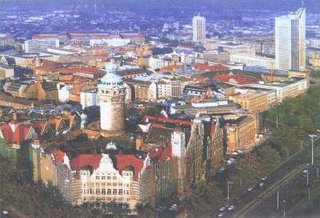Beyond Leipzig: The Future of Depopulation

Doug Saunders is my favorite journalist. After three months in California, I have returned to enjoy his excellent columns in The Globe and Mail — especially today’s fine piece about depopulation. Doug has seen the future and it is Leipzig. (See photo.) Unfortunately, it’s risky to predict much on the basis of extrapolating from one case. He may be right. Or not.
The problem with that East German city is that its population has shrunk by one-fifth since the Berlin Wall fell, party because people emigrated, and partly because of remarkably low Berlin Wallfell, both because its people migrated to the west and because of its remarkably low birthrates. The effects that he reports are all negative. Depopulation causes the tax base to decrease and poverty to increase. In Leipzig, about half the stock of housing stood empty. Because the price of housing declined, people chose to ungrade by moving to larger houses in the city's outskirts At first the city tried to attract new businesses and new residents by building pleasant new structures, but these expensive new buildings also remained empty. It was prohibitively costly to service and police them.
Thus urban politicians finally had to adjust to reality; no one would be occupying these buildings in the future, so the only solution was to tear some of them down. But which ones? Ideally, the outlying housing should be razed and people should return to compact city life, but this solution was unpopular among those who had relocated. Instead, the least desired living quarters were those above shops, and typically these were the apartments selected for demolition. As a result, the ground floor facilities — butchers, bakers, and child-care centers — also were destroyed, depleting the urban core of basic services and making it even less attractive. Where buildings had stood, new parks were created – though parks are expensive to maintain, especially since there hardly any children were now playing in them. Lately Leipzig has converted these vacant spaces to untended urban forests.
Saunders concludes that the rest of us will soon experience depopulation problems too. “Lower population,” he writes, “makes things more expensive, more sprawling, less ecological and far, far more difficult — but your city can still be a happy place.”
His predictions may be borne out, but social scientists have often been mistaken when they have foretold the future. Any number of alternative results can also be anticipated. I’ll mention just two. The first is the unexpected result of the Black Death, which depopulated medieval Europe. Demographic historians say that the population of Europe had already exceeded its optimum size for productivity. The death of so many people created a labor shortage and strengthened the bargaining power of farmers in comparison to the nobility. The hierarchical relations of feudal society were broken down, opening the way for a new, more productive type of social structure. To be sure, the Black Death was horrible, but some of its effects were benign.
Moreover, it is not at all clear that cities in general will go through the depopulation that Saunders has seen in Leipzig, nor that the response will be the same in those cities that do lose citizens. For one thing, the empty apartments can always be filled with immigrants from Third World countries, which are still burgeoning. Not every society will accept the idea of increasing their immigration levels, but that is nevertheless an option.
And besides, if there is a superfluity of housing, not all societies will opt to destroy their inner cities and keep suburbia. Indeed, that is likely to become impossible if the current projections about energy supplies prove correct. Within ten years we may witness the abandonment of monster-sized new homes on the outskirts of cities, and a new demand for compact housing in cities, where people can ride bikes or subways to work. Suburbia is probably doomed. Leipzig may have been premature in razing the apartments in its central core. It will need them again soon.
Or my predictions may also be wrong. There are too many factors to bring into the equation to permit precise predictions. We have to plan, but we’d better not bet the farm that we have guessed right.



0 Comments:
Post a Comment
<< Home